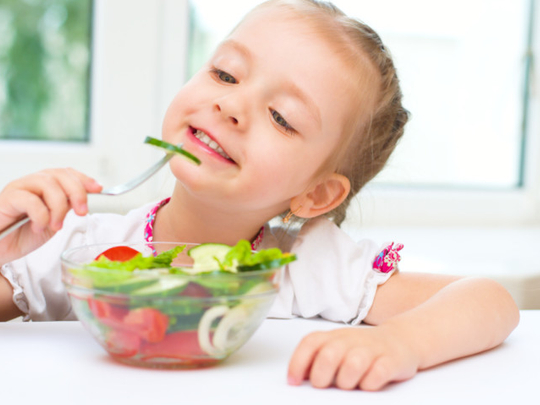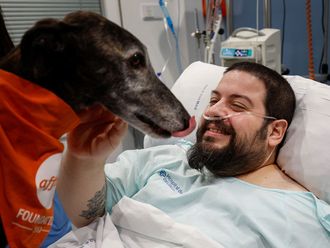
Dubai: Of all the things you can do to help the planet, perhaps the simplest would be trading in the chicken wings on your plate for some carrots and celery instead.
Last week, the world marked Vegetarian Day on October 1, turning the focus on adopting a greener lifestyle. The premise of the month-long awareness movement is that vegetarianism is the healthier, more humane and environmentally friendly option, and can even hold the key to ending poverty!
For online Gulf News reader Catherine Robinson, a hairdresser and salon owner based in Portugal, turning vegan in January this year has transformed her life.
She said: “I used to be exhausted, anxious and depressed from under eating. Now, I eat all I want and maintain a healthy weight. After six years of absence due to calorie restriction, my menstrual cycle returned on a vegan diet.”
Twitter user @captaindeekay is among those people whose food choices have changed for the better. He said: “I turned vegetarian two years ago and my staple diet at most business lunch buffets is hummus and salads now.”
Another Gulf News reader, Madhu Sarda, a 37-year-old artist and part-time teacher based in Dubai, feels it’s the natural choice.
She said: “I think non-vegetarianism started ages ago, when fruits, vegetables and crops were not easily available. If it is a case of eating meat for survival, it is fine. But otherwise, vegetarianism is always the better option.”
The lifestyle has its origins in India, which currently has more vegetarians than the rest of the world combined. In 2007, the Food and Agriculture Organisation (FAO) of the United Nations (UN) ranked India the lowest consumer of meat in the world with the average person consuming 3.2kg per year, about 120kg less than the US.
The health benefits of eating greens are numerous. The American Dietetic Association notes that a vegetarian diet reduces the risk of many chronic degenerative diseases and conditions, including heart disease, cancer, obesity, hypertension, and diabetes.
But apart from its benefits to personal health, switching to vegetables has a potent impact on the world around us.
Right from its production, to packaging, storage and distribution, vegetarian meals have the upper hand over meat-based products.
Several researchers argue that a vegetarian diet can feed more people than a meat-based one. For example, approximately 9,072kg of potatoes can be grown on one acre of land. Comparatively, only around 75kg of beef can be produced on the same size of land.
Additionally, raising animals for food requires a vast amount of resources. According to the website of WorldWatch Institute in the US: “It takes more energy, and generates more emissions, to grow grain, feed it to cows, and produce meat or dairy products for human consumption, than to feed grain to humans directly”.
The FAO estimates that livestock accounts for 18 per cent of all greenhouse gas emissions – that’s more than all forms of fossil fuel-based transport combined. What’s more, methane from livestock is 23 times more powerful than carbon dioxide as a global warming gas.
When considering the environment, leafy greens create a far smaller carbon footprint, especially when sourced locally. Imported foods are three times more likely to be contaminated with pathogens than domestic produce, and four times as likely to have pesticide levels that exceed normal standards, according to US-based Food and Drug Administration (FDA).
However, it can be a challenge to access reasonably priced local produce.
UK-based Gulf News reader Deepali Pattani, who works as a transfer pricing manager, has been vegetarian all her life. She said: “I try to buy my vegetables from a vendor that sources locally, though it often comes at a higher price. Not everyone would be in a position to make the same choice.”
But Portugal based Catherine Robinson believes the economics of what you eat is completely in your control. She said: “The whole concept of a high-carb, low-fat vegan lifestyle is that it is easy, sustainable and can be as expensive or cheap as you like. The bulk of my diet is bananas and potatoes, which is pretty much as cheap as it gets!”
Eating green is also arguably the more humane choice.
In the US alone, 500,000 animals are killed for meat every hour. According to People for the Ethical Treatment of Animals (Peta), every day, millions of male chicks are killed because they will not be able to lay eggs. The misery of animals crammed into windowless sheds and cramped cages during the process of factory farming, has long been touted by animal activists as inhumane and brutal.
Becoming a vegetarian or vegan then, is more about just preferring leafy greens, Robinson adds.
“For me, being vegan is about living in line with my beliefs. I do not want to cause harm to animals, I want to see the planet thrive and the human race fit and healthy. Being vegan encompasses all that, which is why I would recommend everyone to adopt this lifestyle.”

















